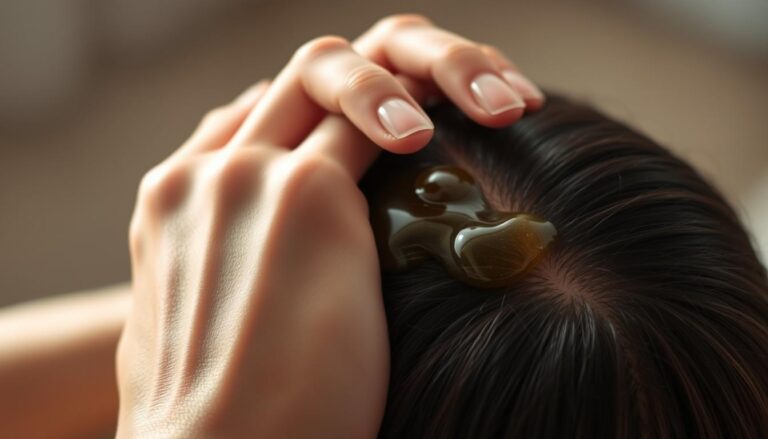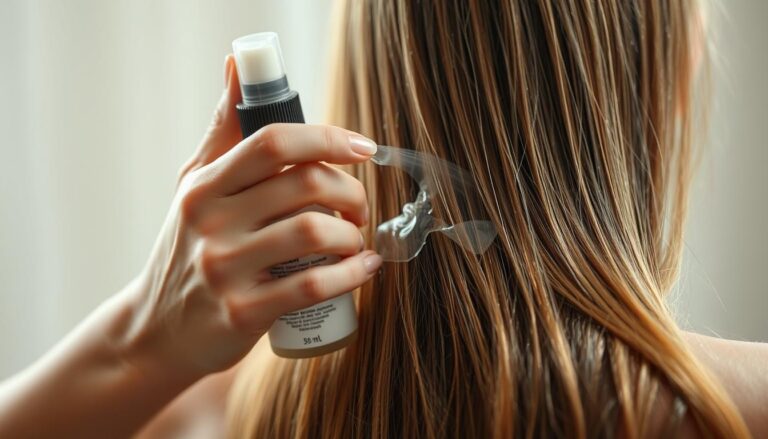At Glowskinhub.com, we believe beauty isn’t just a look—it’s a feeling
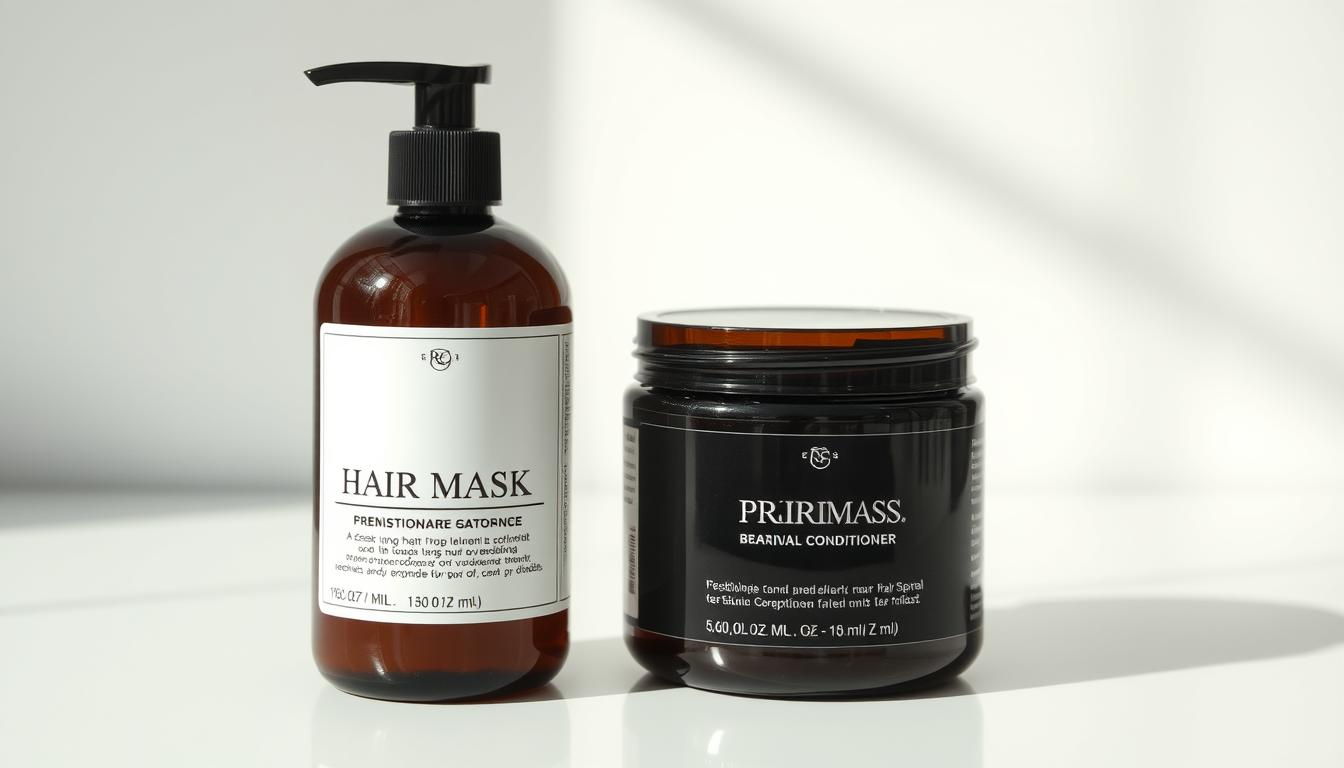
Hair mask vs conditioner: What’s better?
When it comes to Hair Care, understanding the difference between a hair mask and a conditioner is crucial for achieving healthy, luscious locks.
A hair mask is a deep conditioning treatment that provides an intense dose of nourishment to dry, damaged, or processed hair. On the other hand, a conditioner is used after shampooing to help detangle and add moisture to your hair.
For those struggling with oily Hair Care, choosing between a hair mask and a conditioner can be particularly challenging. However, by understanding the unique benefits of each, you can make informed decisions to enhance your Hair Care routine.
Key Takeaways
- Understanding the difference between a hair mask and a conditioner is vital for effective Hair Care.
- A hair mask provides an intense dose of nourishment to dry, damaged, or processed hair.
- A conditioner helps detangle and add moisture to your hair after shampooing.
- Oily Hair Care requires careful consideration when choosing between a hair mask and a conditioner.
- Using the right product for your hair type can significantly enhance your Hair Care routine.
Understanding Hair Care Basics
Hair Care is not just about using the right products, but also understanding your hair’s needs. To maintain healthy and vibrant hair, it’s crucial to grasp the fundamentals of Hair Care.
The Structure of Hair and Why Conditioning Matters
Hair is made up of three layers: the medulla, cortex, and cuticle. The cuticle is the outermost layer, playing a significant role in determining hair’s overall health and appearance. Conditioning is vital as it helps to repair and protect the cuticle, making hair more manageable and resilient.
The cortex, which lies beneath the cuticle, contains melanin, the pigment responsible for hair color. Damage to the cortex can lead to color fade and structural weaknesses in the hair. Conditioning treatments help to nourish the cortex, maintaining hair’s integrity and vibrancy.
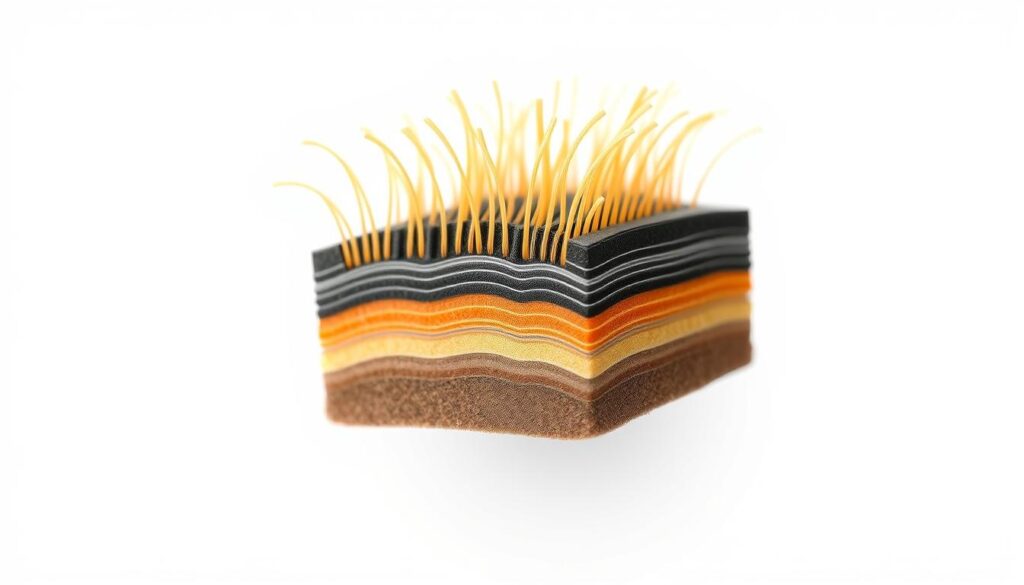
Common Hair Concerns in the UK Climate
The UK climate can be particularly challenging for Hair Care. High humidity and frequent rain showers can lead to frizz and unmanageability, while dry spells can cause dryness and brittleness. According to Hair Care experts, “the UK’s temperate maritime climate, with its cool winters and warm summers, poses a unique challenge for hair health.”
“The UK’s climate variability means that Hair Care routines may need to be adjusted seasonally to combat the specific challenges posed by the weather.”
Common concerns include dryness, dandruff, and color fade. Using the right conditioning treatments can help mitigate these issues. For instance, moisturizing conditioners can combat dryness, while anti-dandruff treatments can help control flaking.
| Hair Concern | Solution |
|---|---|
| Dryness | Moisturizing conditioner |
| Dandruff | Anti-dandruff treatment |
| Color Fade | Color-protecting conditioner |
What Is a Hair Conditioner?
In the realm of Hair Care, conditioners are often overshadowed by shampoos and hair masks, yet they are equally important. A hair conditioner is a product designed to improve the texture and appearance of hair, making it softer, shinier, and more manageable.
Conditioners work by coating the hair shaft, thereby enhancing its smoothness and reducing tangles. This is particularly beneficial for individuals with long or curly hair, as it makes combing easier and less damaging.
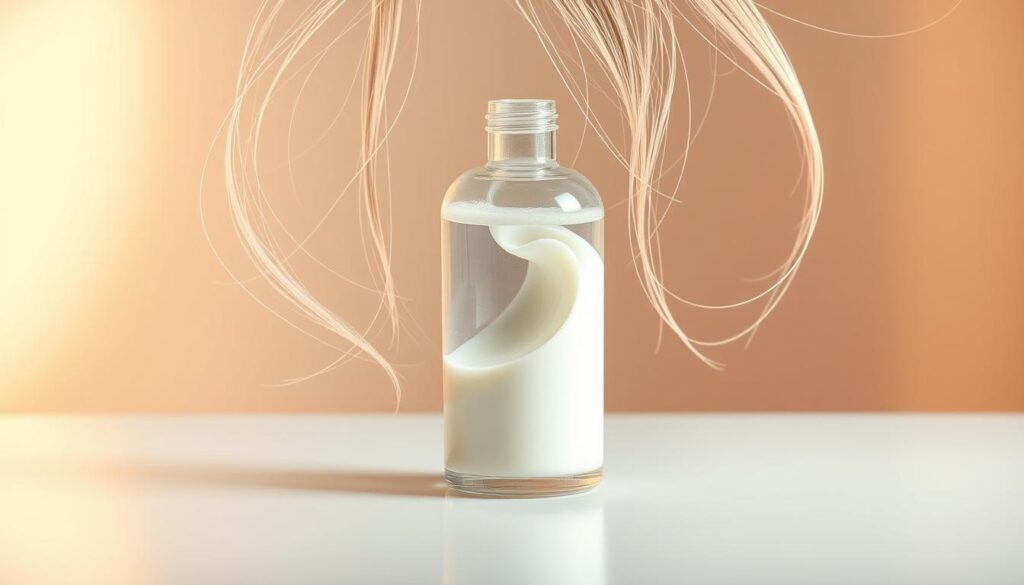
Types of Conditioners Available
There are several types of conditioners available, each catering to different hair needs. Understanding these can help you choose the right conditioner for your hair type.
Daily Conditioners
Daily conditioners are designed for regular use, typically after shampooing. They help maintain the hair’s moisture balance and are suitable for most hair types.
Leave-in Conditioners
Leave-in conditioners are not rinsed out and provide continuous nourishment throughout the day. They are particularly beneficial for dry or damaged hair, offering extra moisture and protection.
How Conditioners Work on Hair Cuticles
Conditioners primarily work by affecting the hair cuticles, the outermost layer of the hair shaft. By smoothing the cuticles, conditioners reduce frizz and enhance the hair’s overall appearance.
This process involves the conditioner ingredients penetrating the cuticle layer and filling in any gaps, resulting in smoother, healthier-looking hair.
Benefits of Regular Conditioning
Regular use of a conditioner can significantly improve hair health. It helps in detangling, reduces breakage, and adds shine to the hair. For individuals with oily Skin, using a conditioner wisely can help maintain a balance, avoiding excessive oiliness while keeping the hair clean and healthy.
By incorporating a conditioner into your daily Hair Care routine, you can achieve more manageable, healthier-looking hair that is less prone to damage.
What Is a Hair Mask?
In the realm of Hair Care, hair masks are revered for their ability to rejuvenate hair. A hair mask is a treatment that provides an intense dose of nourishment, going beyond the capabilities of regular conditioners.
Types of Hair Masks
Hair masks come in various formulations, each designed to address specific hair concerns. The most common types include:
- Protein-Based Masks: Ideal for damaged or weak hair, these masks contain proteins that help repair and strengthen hair structures.
- Moisturising Masks: Designed for dry or dehydrated hair, moisturising masks provide a rich dose of hydration, leaving hair soft and manageable.
Protein-Based Masks
Protein-based masks are particularly beneficial for hair that has been subjected to chemical treatments or excessive heat styling. They work by filling in the gaps within the hair shaft, thereby enhancing its elasticity and strength.
Moisturising Masks
Moisturising masks are perfect for hair that lacks moisture, often due to environmental factors or over-washing. These masks help lock in moisture, reducing frizz and enhancing shine.
Deep Penetration: How Hair Masks Work
Unlike regular conditioners that primarily work on the surface, hair masks penetrate deeper into the hair shaft. This deep penetration allows them to provide a more lasting solution to various hair issues, from dryness to damage.
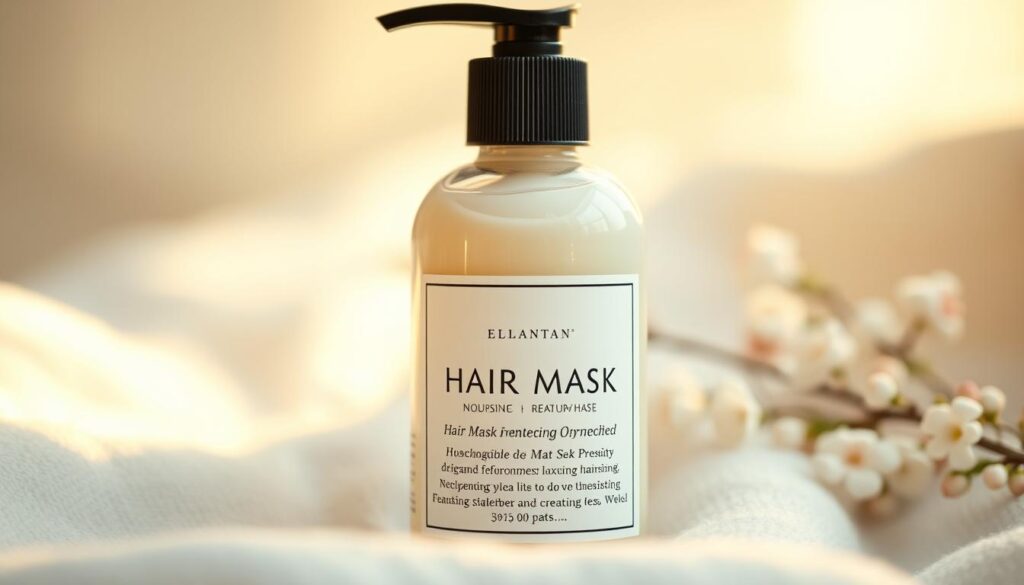
Transformative Benefits of Hair Masks
The benefits of using a hair mask are multifaceted. Not only do they nourish and repair hair, but they also improve its overall appearance and manageability. Regular use of hair masks can lead to softer, shinier, and healthier-looking hair.
Hair Mask vs Conditioner: What’s Better?
Understanding the nuances between hair masks and conditioners can help you make an informed decision about your Hair Care routine. Both products are designed to nourish and protect your hair, but they serve different purposes and offer distinct benefits.
Key Differences in Formulation and Ingredients
Hair masks and conditioners differ significantly in their formulation and ingredients. Conditioners are typically lighter, designed for daily or regular use, and focus on maintaining hair’s health and manageability. Hair masks, on the other hand, are more intensive treatments that penetrate deeper into the hair shaft to repair and restore.
Hair masks often contain higher concentrations of nourishing ingredients such as oils, proteins, and vitamins compared to conditioners. For instance, a hair mask might include ingredients like argan oil or shea butter to provide intense moisturization.
Application Methods and Techniques
The way you apply a hair mask versus a conditioner can also vary. Conditioners are usually applied after shampooing, left on for a minute or two, and then rinsed out. Hair masks are applied similarly but are left on for a longer period, sometimes under a shower cap or with heat, to enhance penetration.
For optimal results, it’s recommended to apply a hair mask to damp hair, focusing on the ends, which tend to be drier. Conditioners, however, can be applied along the length of the hair, depending on your hair type and needs.
Treatment Duration and Frequency
The duration for which you leave a product on your hair and how frequently you use it can significantly impact its effectiveness. Hair masks are designed to be left on for longer periods, often 15-30 minutes, and are typically used once or twice a week. Conditioners are used more frequently, sometimes daily, and are rinsed out much sooner.
| Product | Typical Duration | Frequency of Use |
|---|---|---|
| Hair Mask | 15-30 minutes | 1-2 times a week |
| Conditioner | 1-2 minutes | Daily or with every wash |
Price Point and Value Analysis
When considering the price, conditioners are generally more affordable and used more frequently, making them a staple in daily Hair Care routines. Hair masks, while potentially more expensive per use, offer deep treatment benefits that can be cost-effective in the long run by reducing the need for other hair repair treatments.
Ultimately, the choice between a hair mask and a conditioner depends on your hair’s specific needs and your personal Hair Care goals. For those with damaged or dry hair, incorporating both into your routine could be beneficial.
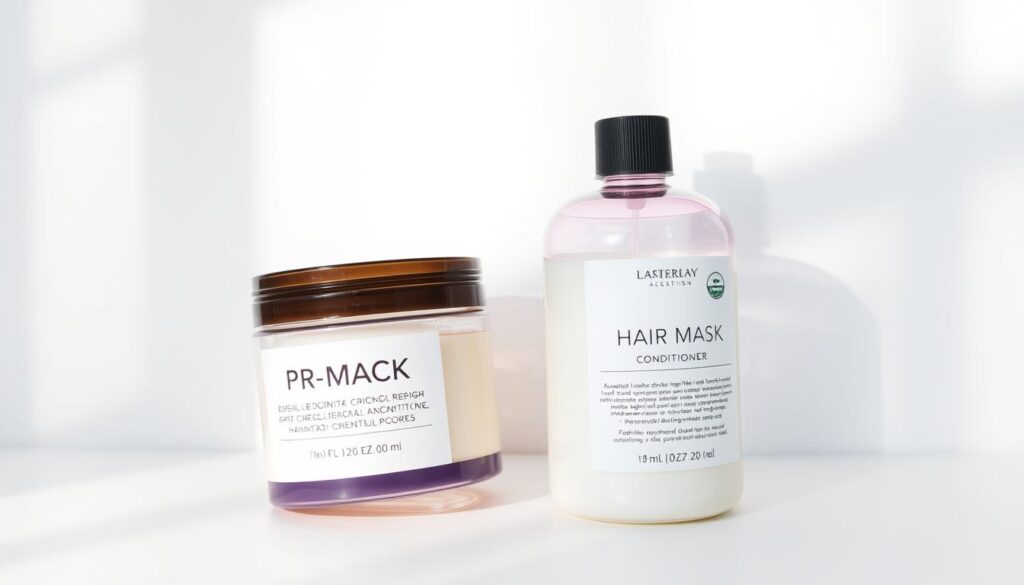
When to Use a Conditioner
Understanding when to use a conditioner can significantly impact your hair’s health and appearance. Conditioners play a crucial role in Hair Care by moisturizing, detangling, and protecting hair from damage. The frequency and method of using a conditioner depend on several factors, including hair type, daily routine, and specific hair concerns.
Incorporating Conditioners into Your Daily Routine
To incorporate conditioners into your daily routine effectively, consider your hair type and needs. For most hair types, using a conditioner after shampooing is a standard practice. However, the frequency can vary; for example, those with dry or damaged hair may benefit from conditioning every time they wash their hair, while those with oily hair might condition less frequently.
Best Hair Types for Regular Conditioning
Regular conditioning is beneficial for various hair types, but it’s especially crucial for dry, damaged, or processed hair. Hair that is subjected to regular styling with heat tools, coloring, or chemical treatments can greatly benefit from frequent conditioning to restore moisture and reduce breakage.
Signs Your Hair Needs More Conditioning
If your hair feels dry, looks dull, or is prone to tangling, it may be a sign that it needs more conditioning. Other indicators include split ends, breakage, or a general lack of manageability. Adjusting your conditioning routine based on these signs can help improve your hair’s overall health and appearance.
| Hair Type | Conditioning Frequency | Benefits |
|---|---|---|
| Dry/Damaged | Every wash | Moisturizes, reduces breakage |
| Oily | Less frequent (e.g., every other wash) | Detangles, adds shine without weighing hair down |
| Normal | Every wash or as needed | Maintains health, enhances manageability |

When to Use a Hair Mask
Determining when to incorporate a hair mask into your Hair Care routine can be crucial for achieving healthy, vibrant locks. Understanding the right timing and frequency of hair mask application can significantly impact its effectiveness.
Creating an Effective Hair Mask Schedule
To reap the benefits of a hair mask, it’s essential to use it at the right frequency. For most hair types, applying a hair mask once or twice a week is sufficient. However, this can vary based on hair type and condition.
Hair Types That Benefit Most from Masks
Different hair types have different needs when it comes to hair masks.
Dry and Damaged Hair
Dry and damaged hair greatly benefits from regular hair mask treatments. These masks help to lock in moisture and repair damage.
Curly and Textured Hair
Curly and textured hair also benefits significantly from hair masks. They help define curls and reduce frizz.
Warning Signs Your Hair Needs a Mask Treatment
There are several signs that indicate your hair is in need of a mask treatment. These include dryness, brittleness, and excessive breakage.
| Hair Type | Benefits of Hair Mask | Recommended Frequency |
|---|---|---|
| Dry and Damaged | Moisture lock, damage repair | Twice a week |
| Curly and Textured | Curl definition, frizz reduction | Once a week |
| Oily | Balancing oil production | Once every 10 days |
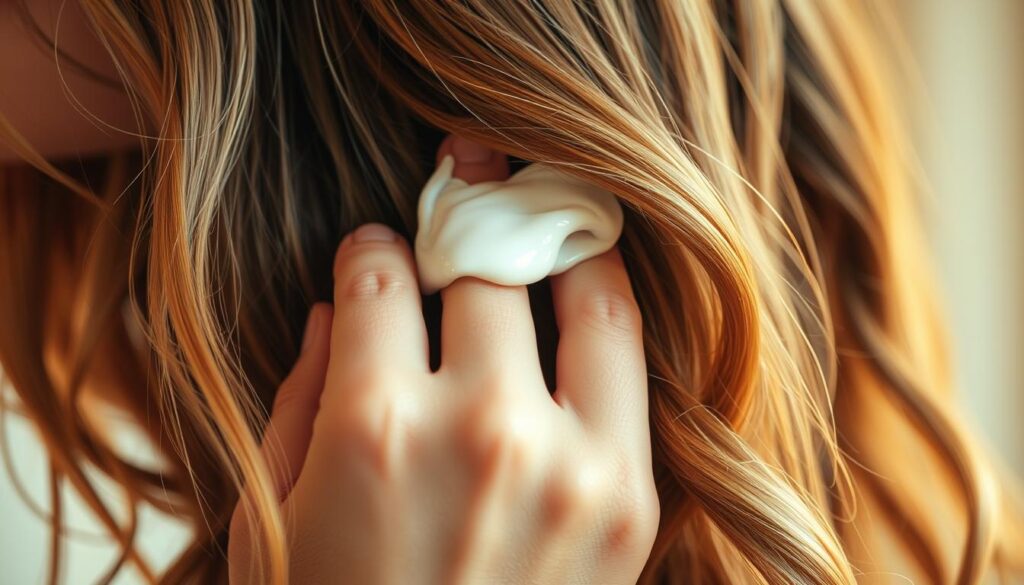
Tailoring Products to Your Hair Type
Hair Care isn’t one-size-fits-all; it requires a personalized approach based on hair type. Different hair types have unique needs, and understanding these needs is crucial for maintaining healthy, vibrant hair.
Fine Hair Solutions
For those with fine hair, the goal is often to add volume without weighing the hair down. Lightweight conditioners and volumizing hair masks can be particularly beneficial. Look for products containing ingredients like glycerin, which helps retain moisture without adding heaviness.
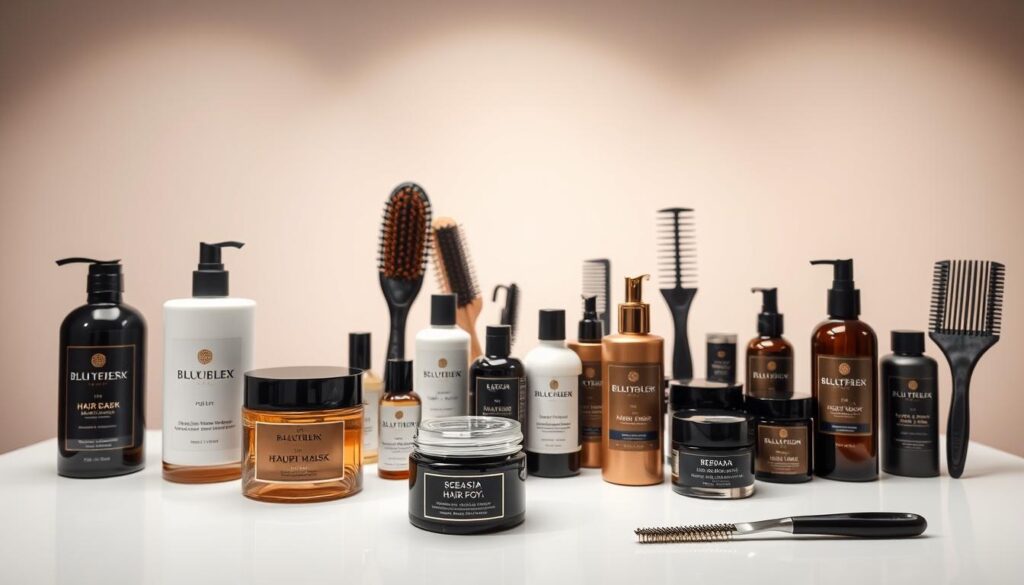
Thick and Coarse Hair Treatments
Thick and coarse hair requires more intense nourishment. Deep conditioning treatments and hair masks with moisturizing ingredients like shea butter or argan oil can help tame frizz and add manageability. Regular use of these products can significantly improve the texture and appearance of thick hair.
Coloured and Chemically Treated Hair Care
Coloured and chemically treated hair needs extra care to maintain its colour and integrity. Colour-protecting conditioners and hair masks formulated for treated hair can help lock in colour and moisture. Ingredients like antioxidants and plant extracts can protect the hair from environmental stressors.
Curly and Textured Hair Needs
Curly and textured hair benefits from products that provide moisture and definition. Hydrating hair masks and leave-in conditioners can help detangle and add shine to curls. Ingredients like coconut oil and aloe vera are particularly beneficial for curly hair, helping to define curls and reduce frizz.
By tailoring your Hair Care products to your specific hair type, you can achieve healthier, more vibrant hair. Whether you have fine, thick, coloured, or curly hair, there’s a wealth of products available to meet your needs.
Top UK Hair Masks and Conditioners
UK residents have access to a wide range of hair masks and conditioners that cater to various hair types and needs.
The market is filled with products from high street brands, salon-quality options, and natural or organic alternatives. Understanding these categories can help you make an informed decision.
High Street Favourites
High street brands offer a variety of hair masks and conditioners that are easily accessible and affordable. Some popular options include:
- L’Oréal Paris Hair Spa: Known for its nourishing properties and affordable price.
- Dove Intensive Repair Hair Mask: Provides deep conditioning for damaged hair.
- TRESemmé Moisture Rich Conditioner: Moisturizes dry hair, leaving it soft and manageable.
Salon-Quality Options
For those seeking professional-grade Hair Care, salon-quality products are available. These often contain high-end ingredients and are designed for specific hair concerns.
- Kérastase Discipline Fluidissime Conditioner: Ideal for smoothing and controlling unruly hair.
- Redken Extreme Strength Conditioner: Strengthens weak hair and prevents breakage.
- Bumble and bumble Hairdresser’s Invisible Oil Conditioner: Adds shine and softness without weighing hair down.
Natural and Organic Alternatives
For individuals preferring natural ingredients, there are several organic hair masks and conditioners available.
- Briogeo Don’t Shampoo Conditioner: A sulfate-free, coconut oil-based conditioner for gentle care.
- Moroccanoil Moisture Repair Conditioner: Utilizes antioxidant-rich ingredients to hydrate and protect hair.
- SheaMoisture Manuka Honey & Mafura Oil Intensive Hydration Mask: Provides intense hydration for dry, damaged hair.
By considering these top hair masks and conditioners, you can find the perfect product to enhance your Hair Care routine.
Conclusion
Choosing between a hair mask and a conditioner depends on your hair’s specific needs. For daily maintenance, a conditioner is essential, helping to keep your hair manageable and healthy. On the other hand, a hair mask provides an intense treatment that can address specific hair concerns such as dryness, damage, or color preservation.
Understanding your hair type and its requirements is crucial in deciding whether to use a conditioner or a hair mask. By incorporating the right product into your Hair Care routine, you can achieve healthier, more vibrant hair. While the best skincare routine for oily Skin may differ, the principles of tailored care can also apply to Hair Care, emphasizing the importance of personalized routines.
Ultimately, both conditioners and hair masks have their place in a comprehensive Hair Care regimen. By choosing the right product for your hair’s needs, you can enjoy the benefits of well-cared-for hair that looks and feels its best.

